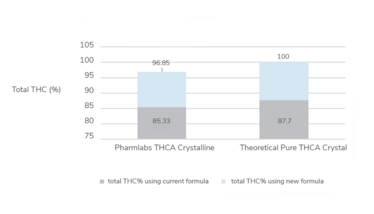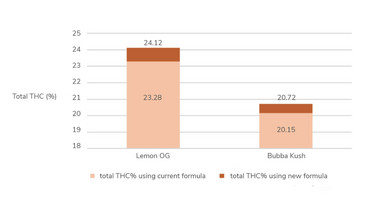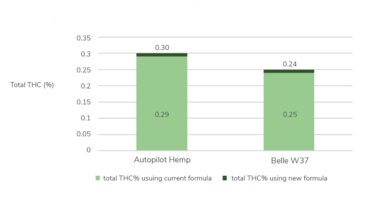Totally miscalculated: The Total THC Problem
Why we’ve been calculating the percentage of THC after decarboxylation wrong – and what we can do to get it right

Imagine you want to purchase a pure THCA crystal. You check the package, and to your surprise, it only shows 88% total THC.
Total THC is calculated by combining the weight percent of THC and THCA in the product. THCA is the naturally produced cannabinoid and an acid precursor of the intoxicating THC molecule. When you smoke a joint, the heat will remove the acid group in a process called decarboxylation, turning the molecule into the desired THC 1. The calculated total THC is meant to represent the maximum amount of THC that is consumed. If you have a 100% pure THCA crystal, and it undergoes decarboxylation, the acid groups will leave as CO2 gas, and you will be left with 100% pure THC. So, why does the packaging for this pure crystal say otherwise?
Because we have been calculating Total THC wrong.
When calculating the total percentage of THC after decarboxylation, the formula shown below is used.
THCA(%wt.)× 0.877+∆9THC(%wt.)
The percentage by weight of THCA is multiplied by 0.877 to account for the weight lost during the decarboxylation process. When that acid group comes off as CO2 gas, the molecule loses the weight of the acid group and becomes lighter. The resulting number is then added to the percent weight of preexisting THC to get the total amount of THC in the product. Therefore, the THCA crystal shows the following result: 100%THCA*0.877+0%THC=88%.
The problem with this formula is it only accounts for the weight loss of the THCA molecules, but not the weight loss of the entire cannabis product during decarboxylation. Since THCA can make up a significant amount of the total product, and it is becoming lighter, we need to also consider the fact that the product loses weight. Not accounting for the weight loss of the product leads us to divide by a larger weight than what is accurate. This in turn gives us a Total THC smaller than what would be in the product.
To accommodate for the weight loss of the product, we need to also subtract the weight lost from the THCA molecule in the denominator. Therefore, we get the formula below.
(0.877*THCA + THC)/ (Product − 0.123*THCA)
As we are calculating weight percentages, the weight of the product before decarboxylation is defined as 100%. Only when we account for the weight loss of the entire sample do we see that a pure THCA crystal after it is decarboxylated has a 100% Total THC.
So how significant is this change? The figures below show the total THC calculated for all products increases when this new formula is used. Total THC levels are one of the factors considered by companies to set the prices for their products23. As a result of this mathematical error, companies have been undervaluing their products (even a 1% increase in total THC has an influence on price), which means they have lost out on potential revenue. Using the corrected formula, companies will be able to realize higher sales prices.



Figure 1: Compared total THC of Cannabis Products using Current and Corrected Formula. The total THC is calculated using the current and proposed corrected (new) formula. All figures overlay the current and corrected amounts for comparison. 1a). The total THC for Pharmlabs’ THCA Crystal, and a Theoretical completely pure THCA crystal. 1b). The total THC for Lemon OG and Bubba Cush cannabis products. 1c). The total THC for Autopilot and Belle W37 hemp products.
Total THC levels are also used to legally define the difference between cannabis and hemp, with levels at 0.3% or higher being arbitrarily classified as cannabis, and less than being hemp 4. As the corrected formula does take the change in sample weight into account, and most of the weight loss would stem from CBDA to CBD decarboxylation, all weight lost from cannabinoid acids must also be considered. Using the new formula, we can see hemp being farmed for CBD listed as having 0.29% total THC might now fail to be classified as legal hemp in the states (figure 1c). For hemp farmers, this could cause a significant loss in usable plants, and therefore a loss in profit.
With the consequences being what they are, you might wonder why no one noticed this mathematical error before… Though the cannabis industry is growing fast, comprehensive work on improving basic things has been lacking. We can all agree that the big changes happening in cannabis are exciting and important - but we should never forget the importance of going back to the basics.
- Cesarone, T. How Does THCA Change After It’s Decarboxylated? cannabislifenetwork (2021).
- Mahamad, S., Wadsworth, E., Rynard, V., Goodman, S. & Hammond, D. Availability, retail price and potency of legal and illegal cannabis in Canada after recreational cannabis legalisation. Drug and Alcohol Review 39, 337–346 (2020).
- Smart, R., Caulkins, J. P., Kilmer, B., Davenport, S. & Midgette, G. Variation in cannabis potency and prices in a newly legal market: evidence from 30 million cannabis sales in Washington state. Addiction 112, (2017).
- Mead, A. Legal and regulatory issues governing cannabis and cannabis-derived products in the United States. Frontiers in Plant Science 10, 697 (2019).
Markus Roggen, Founder and CEO, DELIC Labs (formerly Complex Biotech Discovery Ventures), Vancouver, Canada












